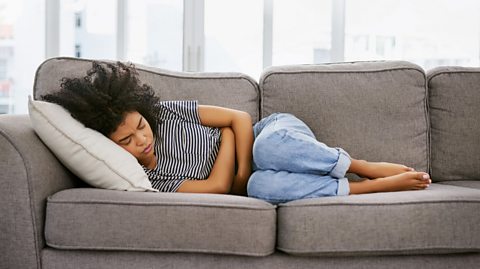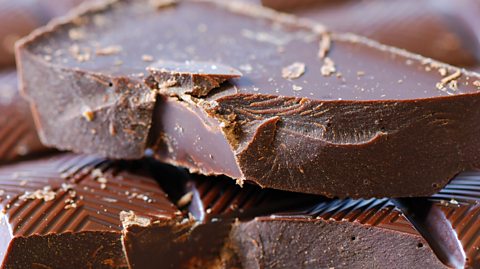If you've had a period so bad you couldn't do simple everyday activities, you're not alone. And yet, many of us still find it embarrassing to talk about.
The charity Womenās Health Concern estimates around 80% of women will experience period pain at some point in their life. But concerns are often trivialised, or even dismissed altogether. And while it's never nice to be in pain, sometimes it can be particularly disruptive - for example, when you have an exam, or on your first day of a new job. Being told to just 'get on with it' is just not what you want to hear.
You learn about the reproductive cycle and menstruation in Biology lessons at school, but conversations about the effects of this on women beyond the textbook seem few and far between.
But itās something that people are actively seeking information on; according to search term tracker SEMrush, in 2018 the amount of Google searches including the phrase āperiod painā rose by almost 50,000 to over 1.2m searches.
Why does it hurt?
You may already know that when you menstruate, the lining of womb sheds, as a fertilised egg hasnāt attached to it. The NHS website explains that during this process, your womb contracts vigorously to encourage this process to take place. These contractions cut off the blood and therefore oxygen supply to your womb, which triggers the release of pain chemicals. Lipids (fatty acids) called prostaglandins are also formed at sites of tissue damage, sending pain signals as part of the healing process.
If your period pain isnāt caused by a condition such as endometriosis, itās called primary dysmenorrhoea. Dr Jacqueline Maybin, who works with womenās health charity Wellbeing for Women, and is a Senior Research Fellow and Consultant Gynaecologist at the University of Edinburgh, says that this is āpain due to an exaggerated ānormalā periodā. She explains that it can be worse in younger girls when they first start menstruating, as: ātheir system isnāt honed yet, and can sometimes go into overdrive or be quite irregular.ā
'I collapsed in the school corridor when I was in sixth form'
But knowing the physical causes of it doesnāt always help with how difficult period pain can be to deal with. Rebecca, 32, described how she often got hot flushes and shooting pains, but on particularly bad days she would: ācrawl into a ball on all fours to try and ease itā.

Lots of other women spoke to “óĻó“«Ć½ Bitesize of their incredible physical agony too. On top of cramping and nausea, Nikki, 22 (who has polycystic ovary syndrome) said āsometimes itās so bad I struggle to walk and get out of bed in the morningā and in one very distressing case, Cate, 22, admitted she had once collapsed in the school corridor when she was in sixth form because the pain had become so overwhelming.
She explained that sheād taken painkillers, but they didnāt help at all. When the nausea became too much, she ran to the toilet, but by the time she got there, she couldnāt see, hear, or stand up.
When Cateās teachers rushed to help her, she said that she found it difficult to explain to them why it had happened: āthey looked after me of course, but when I told them I was feeling like this because of period pain they were surprised, and it was almost like they didnāt know what to do. In the end they called my mum and I went home. It was embarrassing because I think itās something weāre just expected to deal with.ā
'All girls have periods - she isnāt special'
Cateās embarrassment isnāt an isolated case. Rebecca said that she didnāt want to call in sick to her first job in retail, as āit wouldnāt make a good impressionā. Carly, 29, said that the first time her mum had to call into her school to say she couldnāt attend due to period pain, they had responded by saying āall girls have periods, she isnāt specialā.
This apparent lack of understanding can be especially stressful for sufferers of period pain during exams.
Chloe, 21, said that after she got the coil contraceptive (otherwise known as the intrauterine device or IUD), her period pain got extremely bad. In a case of unfortunate timing, she had it put in around the time of her dissertation deadline and final exams at university.
She described sitting her exams in āexcruciating painā, so much so that she resorted to bringing in a hot water bottle with her, in order to ābe able to sit up in a chair for three hoursā.

Her invigilators were a mixture of "sympatheticā and āperplexedā, but they allowed it after checking that she wasnāt hiding any notes inside of the hot water bottle. One of the worst parts for her though, was that there was a rule that meant during parts of her exam, she wasnāt allowed to go to the bathroom.
Even this seemingly minor restriction made her exam extremely uncomfortable, and she thinks that more should be done to make allowances for people sitting them when suffering with period pain: āI think mitigating circumstances or even just accommodations are definitely something they should consider - I was one of three girls in a small class full of boys taking the exam, and they all noted how unfair it was that we were given the same conditions when I was literally white because of the pain.ā
If you know your period is coming up around exam time, and if talking to someone who can help isnāt an option, Dr Maybin says itās possible to get things in place beforehand that might help: āSome hormonal treatments will stop periods completely as they keep the womb lining thin, meaning it doesnāt need to shed.ā Over the counter pain medication can help too.
Education, education, education
Research recently conducted by Plan International UK shows that itās extremely common for period pain to affect exams, and for some girls it can be even worse. They found that not only have 66% of girls felt unable to sit an exam because they have their period, one in five girls have experienced teasing or bullying about their periods. Only half of those surveyed ever spoke to someone about it.
What can be done, then? Lucy Russell, Plan International UKās Head of Girlsā Rights and Youth Team, says that the āroot of the problemā is ācultural attitudes to girlās bodiesā, in that theyāre told that theyāre dirty or taboo. The solution then, in her opinion, is education, education, education. But not just in strict biological terms: āThatās something that came really strongly from the young people, they donāt just want to see diagrams of bodies, they want to know about the real lived experience of having a periodā¦ [and] what helps in the real world.ā
Other ābureaucratic obstaclesā need to be tackled too according to Lucy, such as rules on when you can and canāt go to the toilet, and access to period products: āwhen youāre stressed for exams, the likelihood of forgetting products is very highā.
But essentially, she says itās all about talking - just having the initial conversation, and helping peopleās perception of periods go from something secretive and taboo, to a normal, healthy, bodily function.
This article was published in May 2019
Dr Alex debunks health myths
Does chicken soup cure a cold? The Love Island star has the answer to this - and more.

What exactly is self-care?
What does self-care actually mean and why is it so important?

A brief history of chocolate
It's delicious, but where does it come from?
